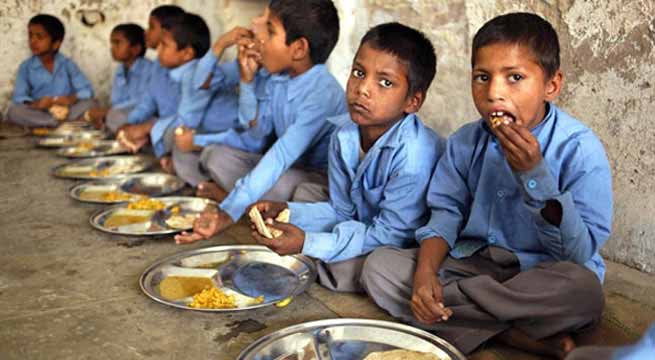
The Indian State of Assam is witnessing widespread protests and agitations against the government’s move to engage NGOs in cooking and distribution of mid-day meal in schools. The uproar was caused in August this year, when the Central government told Assam government that it may use the facility of the centralised kitchen for midday meals while involving various NGOs instead of regularizing the existing work force. The protests are being spearheaded by All Assam Mid-day Meal Workers Union (AAMMWU) in collaboration with Centre of Indian Trade Union (CITU).
The workers argue that it is their last resort to protect their jobs. The process of outsourcing cooking and distribution of meals to non-profit organisations in 17 districts of the state from November.
Trade unions, including the Rashtriya Swayamsevak Sangh-affiliated Bharatiya Mazdoor Sangh (BMS) have also described this decision of MHRD as “unjustified” and said it would add to the current job crisis.
The State government argue the decision to employ non-governmental players was in keeping with the latest Central government guidelines, passed in October. According to the guidelines, switching to centralised kitchen facilities in “identified rural areas which have good road connectivity and viable cluster of schools, for purpose of leveraging efficiency gain” is prescribed. Food will be prepared in large quantities at these privately run kitchens and then transported to schools.
The centralised kitchens were restricted to urban areas only till now.
The framers of the guidelines have argued that earlier system of mid day meals involved whole school machinery and staff which then lead to decline in the quality of teaching. Also there were complaints about irregularities on the part of head teacher in some cases. Therefore, this new centralized system is being brought in as it will ensure quantity and quality while saving schools’ resources and time.
The midday meal scheme provides one hot cooked meal a day to children enrolled in primary and upper primary education in all government schools. It is aimed at reducing school drop-out rates and fighting malnutrition. The Centre and state governments jointly fund the scheme. The people, maily women, engaged in preparing these meals are called “volunteers” and paid a flat “honorarium” of Rs 1,000. According to government data, more than 25 lakh “cook-cum-helper[s]” are engaged across the country in making food as part of this scheme. The central government gives an honorarium of Rs 1,000 a month to each cook-cum-helper while most states add varying amounts from their own budget.
But over the years, the Centre is slowly outsourcing meal preparations to non-profits organizations. Experts argue, the government’s October guidelines, institutionalizes this shift toward centralisation.
The protesters, demanding security assurances from the government, are taking to the streets, blocking highways in several parts of the state. They allege that the centralised kitchens have made them dispensable and the non-profits would displace them sooner or later.
The centralised system also has been facing some other challenges. In some parts, students refused to eat the food prepared in the centralised kitchens, citing bad quality.
Experts are also sceptical about centralised kitchens. “The freshness of the food is likely to be compromised since the density of schools in rural area is not that high,” said economist Reetika Khera, who has extensively studied the scheme. “And if, to prevent the food from going bad, they are putting it in refrigerated vans, it is going to increase costs.”Apart from that, the centralised form of cooking also come with less accountability, according to Ms Khera.













